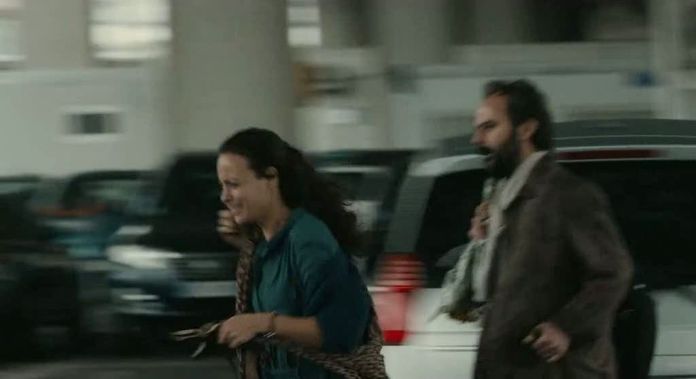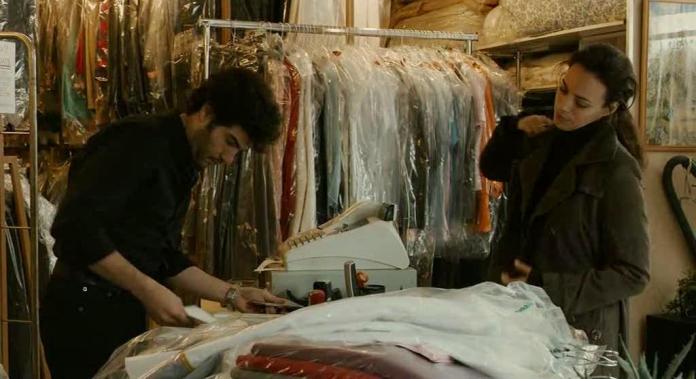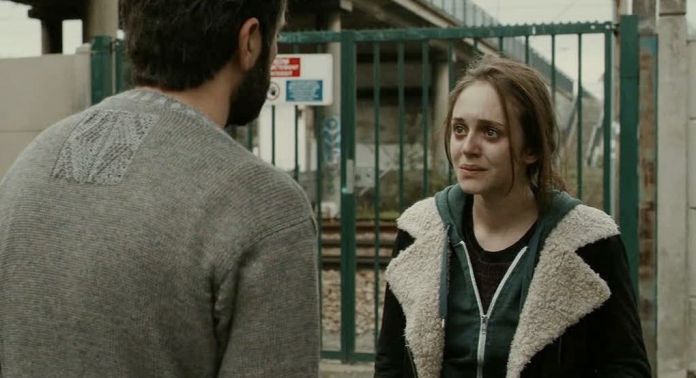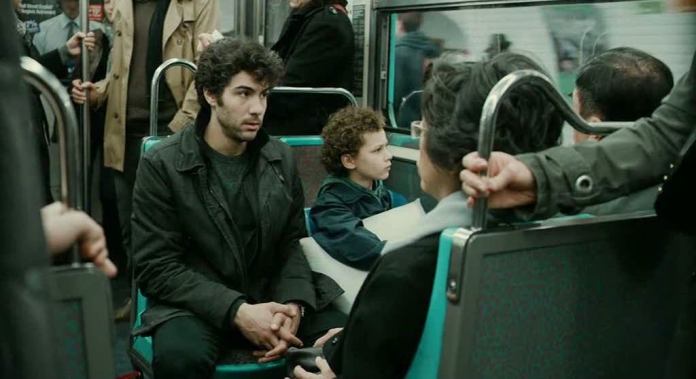Le Passé
.

.
Director/Screenwriter: Asghar Farhadi
By Roderick Heath
Asghar Farhadi, since his critical breakthrough with About Elly (2009) and the international success of A Separation (2011), seems to embody several arresting contradictions. He’s an Iranian filmmaker, and like many of the captivating talents that country has produced in the past few decades, the restrictions placed on what artists can depict only seem to have liberated a deeper fount of creativity. He’s a more convincingly sophisticated artist of the interpersonal drama than just about any western filmmaker to emerge in recent years, acute to the rhythms and quirks of contemporary life and morals. But his methods avoid the deadweight reflexes of too much modern pseud drama and cinema. His work has some similarities to that now-common brand of realist filmmaking best exemplified by the likes of the Dardennes brothers, but really seems to harken back more to the theatrical traditions of major 19th century playwrights like Strindberg, Ibsen, and Chekhov and the dense, morally and psychologically interrogative efforts of European film greats like Ingmar Bergman’s early, more domestically focused works and aspects of Roberto Rossellini and Robert Bresson’s oeuvres. Whilst not as cinematically vivid as Bergman or as stringent as Bresson, Farhadi creates, like them, vivid, exactingly wrought tales of interpersonal crisis and conflict with a discreet sense of social context. Farhadi’s filmmaking is sleek and functional, but not in an impersonal fashion: there’s a tautness and concision to his framings and camerawork, a sense of space and the largesse of the screen, which feels organic, even epic.
.

.
The Past, his latest film, shifts ground insofar as it’s a French film, set in Paris, though it does deal with Iranian émigrés, with a subtle undertow in the dramatic flow stemming from the dissonance of displacement and estrangement. The search for exact truth in A Separation and The Past is both the aim of the characters and an impossibility because the viewpoints keep shifting. Motivations that make perfect sense to one might be incomprehensible to another. Experience and truth spread out in interlapping but distinct ripples from the actions of each character.
.

.
Farhadi kicks off with Ahmad (Ali Mosaffa) arriving at a Paris airport where he’s met by his wife Marie (Bérénice Bejo): she spies him through a pane of glass separating the incoming passengers and they communicate amusedly via signs and mouthed words. This proves to be the easiest, most relaxed act of communication in the film, because once the glass is gone, discomforting familiarity begins to creep in. The two make a mad dash through the rain in almost romantic fashion, but then they’re locked in a small, breathless, steamy car together. It becomes clear that Ahmad has returned to Paris from Iran to give Marie a divorce after several years of separation. Marie stops by a high school en route to pick up eldest daughter Lucie (Pauline Burlet), but she’s already fled, as has been her recent habit. Entering the yard of Marie’s sizeable old townhouse, Ahmad is recognised by one of the children playing in the yard, Léa (Jeanne Jestin), but not the other, Fouad (Elyes Aguis), the son of Marie’s current beau, Samir (Tahar Rahim). Ahmad arrives apparently oblivious to Marie’s current situation and is bewildered because she’s neglected to book him a hotel room. She says she held off with the booking because the last time he planned to come, he failed to show.
.

.
Marie tries to billet him in a bunk bed with Fouad, but Fouad throws a tantrum and tries to flee the house for his and his father’s apartment. An infuriated Marie drags him back and locks him in a parlour. The camera takes Ahmad’s place as accidental eavesdropper as Marie’s struggle with Fouad, staged and shot from a high window as a half-comic, half-alarming Coyote and Road Runner chase about the back yard. Soon, the tension underlying the strained attempts at civility and modern cool about the odd family situation proves to have deeper sources, and the sense that some explosion is inevitable builds as Ahmad comes to realise what’s going on. One of Farhadi’s most fundamental observational and dramatic elements here is also one of the more problematic aspects of his film: the family under study here is complicated, with about one layer too many for use. Neither Lucie nor Léa are Ahmad’s children, but the product of yet another of Marie’s ill-fated unions: their father lives in Brussels. But this difficulty is part of Farhadi’s point, that today, many families are indeed such fluid, ad hoc, but perversely binding creations, easy to leave but impossible to escape.
.

.
Farhadi’s observational streak is in marvellous form in these scenes: Ahmad and Marie trying to dry themselves with tissues in the car; the blob of spilt paint that drives Marie into a rage with Fouad, and Fouad’s hostile, but curious first handshake with Ahmad; Ahmad dutifully taking a blow dryer to Marie’s hair after they arrive home; Ahmad’s quizzicality and Fouad’s fury as they try to make up the bunk-bed they share, each aware to a degree that they’re extraneous males in the house and somehow, intentionally or not, they’ve been put together for that reason; Fouad viciously stabbing at corncobs in reactive irritation when helping Ahmad prepare dinner until he cuts himself; the few seconds it takes Léa to recognise her stepfather, whom she then calls by his first name but with genuine affection, revealing much about his parental status. Lucie, when she does finally show up, takes refuge in her bedroom, but Ahmad is able to communicate with her, especially when he takes her to visit his friend, Shahryar (Babak Karimi), another expat who runs a café, providing memories of happier times. Meanwhile, Samir sits in the paternal position at the table, but with distinct unease: Lucie won’t speak to him, and he distractedly tries to observe how Marie acts with Ahmad, peering out at them as he tries to paint a room.
.

.
Samir runs an inner-city dry cleaners, and, it emerges, he still has a wife, albeit one who’s in a coma she will probably never come out of. Her state is the result of depression-fueled suicide attempt in front of Samir’s assistant, Naïma (Sabrina Ouazani), an illegal immigrant. That malady and suicidal thoughts have also dogged Ahmad, as his inability to adjust to life in France destroyed his marriage to Marie, but he generally seems pleasant and intelligent. Soon, however, he is placed under strange pressures that rub his patience raw, as Marie asks him to speak to Lucie and find out why she’s been difficult recently. Ahmad solicitously interviews Lucie and is satisfied at first with Lucie’s explanation that she doesn’t want her mother to get married again, especially to a man Lucie dislikes.
.

.
A delicate equilibrium forms in Marie’s house as Ahmad plays house-husband, cooking meals and trying to fix a faulty sink, a task which Samir takes over after Ahmad seems to have effortlessly stitched himself into the fabric of the place, even proving skilled at drawing Fouad out of his funk. Samir’s stern approach to fathering contrasts Ahmad’s ability to create a rapport with the kids: after Fouad and Léa pinch one of Ahmad’s gifts for the family from his suitcase, Samir puts Fouad through an interrogation where he forces the lad to meet his eyes and doesn’t want to let the kids get away with apologising because that would teach them all they have to do is say they’re sorry to be absolved. This seemingly throwaway moment proves to be the film’s main thesis, as Farhadi examines the way people try to mollify others with civilities, but nonetheless take actions that incur genuine consequences.
.

.
The younger characters contrast the older ones. Marie, in particular, tries to discard the past before it strangles her chances for happiness, whereas the children try to cling to their pasts, the things they know. Fouad deals with alienation and changes with bratty aggression, whilst Lucie plays adult games and is shocked at the real, awful consequences that occur. Farhadi’s fascination for watching ambiguities in a situation proliferate until all viewpoints seem to cancel each other out recalls Otto Preminger’s, and, indeed, aspects of the story resemble Bonjour Tristesse (1958), particularly in the theme of a teen girl trying to thwart a parent’s love affair, and standing back in shock at the results. Lucie’s angst, it emerges, stems from her distaste for Marie and Samir’s relationship, a distaste that proves much deeper and more significant than mere adolescent resentment. Lucie almost desperately explains to Ahmad that Marie’s remarriage would mean she would lose her old home, the one they shared with Ahmad, forever, and later furiously informs Ahmad, “You know why she went to that filthy man? Because he reminded her of you.” Lucie’s observation here seems coldly accurate on at least one level, as Samir certainly suggests Ahmad Mark II, less interesting and talented as a family man, but more reassuringly mundane and workaday.
.

.
Marie works as a chemist around the corner from Samir’s laundry, and they seem nicely in synch as sleek, fit, moderately successful worker bees. One of Farhadi’s most succinct shots offers a trio of fancy lampshades for redecorating the house, signifying their hope for the future and also their status as bourgeois clichés in their fetishism of faux-antique security. They move like people who know the score and carry a faint aura of both longing and old hurt in their manners. Marie and Samir’s desire to get on with life together and cast off old baggage has a wilful quality with a vaguely psychopathic note, which they themselves have noticed and which haunts their every motion. This note turns out to have predated the tragedy of Samir’s wife: they started an affair before the suicide attempt, when Marie was lonely and Samir stopped by the chemist’s for his wife’s antidepressants. Ahmad and Samir’s wife (like Marie, she’s “French”) share maladies, as both are depressives who are written off as deadweight by their functional spouses, wrong choices who don’t fit with the program.
.

.
Farhadi’s major conceit in telling this story lies in how he moves distinctly between four characters as focal point, from Ahmad to Lucie to Marie to Samir, with Samir scarcely making an impression in the first half-hour as the perspective belongs to Ahmad; by the end, Ahmad has more or less vanished, written out of the drama as he becomes irrelevant to the new marital quandary. The kitchen of Marie’s house becomes shifting territory in domestic war. The film’s middle act is, in its dramatic structure, a little like one of those slapstick comedy gags where characters dart in and out of a long corridor, disappearing and reappearing in increasingly tangled and improbable places and patterns, as Lucie vanishes, forcing the others to hunt for her. Tempers boil, old wounds open, resentments arise, tiny physical and emotional cues spark heated reactions, and in trying to deal with the problem they chase their own tails.
.

.
Eventually, the real root of the drama is revealed as Lucie confesses that she believes Marie and Samir’s affair caused the attempted suicide of Samir’s wife. Ahmad tries to assuage her fears by having her talk to Naïma, whose account of the day puts the tragic turn down to altercations with a client. But, both Lucie and Naïma have secrets involving that day. Lucie confesses hers first: she logged on to Marie’s computer and forwarded to Samir’s wife the emails Marie and Samir had been writing to each other. The notion of verboten love letters resting at the heart of a familial melodrama is given a cunning modern makeover by this device, as the email medium’s rapidity has removed the safeguards of time from the heat of immediate strong feeling, which I’m sure we’re familiar with now—the “I shouldn’t have done that” moment where technology has allowed emotion to outpace good sense. Indeed, the ambiguity of such communication has already been touched on, as Marie and Ahmad bicker about whether she really sent him messages that would have forestalled the accommodation problems he’s faced with on his arrival. Ahmad’s attempt to mediate Marie’s discovery of Lucie’s awful, guilty act and make sure the rupture is stemmed results only in an ugly explosion of rage and grief, as Marie assaults her daughter in the kitchen, screaming with telling outrage, “How could you do this to me?” The film has obviously been building up to such an eruption, though Farhadi delays it cleverly. The hot flare of Marie’s anger doesn’t last long, and she calls her forlorn daughter back from the railway station as she prepares to take her leave, perhaps the film’s finest recognition of the way powerful emotions alternate and feed each other in family conflicts, the rapid successions of egocentric rage and abject forgiveness.
.

.
Lucie’s confession seems to offer a cut-and-dried confirmation of the anxiety behind Marie and Samir’s relationship, the one that constantly threatens to cleave them apart in guilt and shame, already apparent in the simple act of trying to hold hands, but it soon proves even more complex. Naïma proves to have played a part, too, as she provided another link in the chain that might have brought the adulterous messages to the wife’s attention as a petty revenge for suspicions that she and Samir were having the affair. When the investigations to nail down the truth lead Samir to his employee, he angrily ejects her from his life and her job. But the onus of causative guilt can’t be shifted so easily onto Naïma’s act of hapless spite, for, as she retorts to Samir, she still can’t understand why Samir’s wife staged her act in front of her instead of him or Marie. Naïma, like Sareh Bayat’s Razieh in A Separation, becomes a figure the other characters try to turn into a villain for her genuine act of wrongdoing, but with obnoxious readiness on their part to offload their own guilt whilst disregarding the anxiety and difficult position that caused the wrong in the first place. The point is plain, but thankfully not forced down our throats: as much as the characters want one, there is no easy moral out for anyone. Farhadi is obviously staging a merciless gag at the expense of the modern faith in “closure,” the idea that a ritualised conclusion for something will sever past from future and remake you. “I didn’t want you to be in torment for the rest of your life!” Ahmad explains to Lucie, a sobbing, fleeing mess after being ejected by Marie. “I’m not now?” a beggared Marie retorts.
.

.
The Past, from its title inward, notes that human character is the sum of its accumulated experiences rather than a free-floating entity, and by definition, therefore, the past cannot be left behind. On the most literal and humdrum level here, this is apparent in the complex mesh of affection and enmity, hope and disappointment that exists between Ahmad and Marie and the children, with Samir as ambiguous new spoke on the wheel and the body of Samir’s wife, paralysed, probably brain-dead, voiceless and powerless, but doggedly clinging to life with tormenting ambiguity. Farhadi, who’s already taken aim at the byzantine, unforgiving qualities of his homeland’s mix of theocracy and bureaucracy in civil life, explores this new realm on the microcosmic level, wringing out each character’s attitude to their own lives past and future, but with overtones that could also be cultural and political. Just as western bourgeois family life is predicated today around an unstable binary ideal of personal liberty that can, on the basic levels of society, both bind and damage individuals and those close to them, so, too, are western bourgeois politics based on a sharklike need for forward movement, a carefully fostered rejection of the past.
.

.
Indeed, the family under study here quickly comes to resemble modern geopolitics. There are proliferating ghosts of past wrongs with accompanying guilt complexes, accumulating dependents, self-righteous busy bodies, emotional and physical emigrants, and bewildered holders of dual citizenship: Ahmad’s status as a man not at home in France, but solitary in Iran correlates to Lucie’s feelings of uncertainty about three different, equal variations of her “family.” There are makeshift states, acts of terrorism, invasions, and even moments of peace and amity. Farhadi is not a political filmmaker, at least not in the didactic sense, or even a maker of parables, but his observations of human behaviour on a small scale are relevant to the larger. The theatrical sensibility Farhadi brings to his material is more noticeable here than with A Separation. If it seems to be a slightly lesser achievement, it might well stem from the lack of the overarching tension the earlier film sustained about the contentious relationship of the individual to the state. Farhadi was able to string out elaborate narrative pressures and concurrent emotional volatility in his characters from very simple acts because of that contention, whereas in transferring his methodology to a French setting, he needs to up the stakes to shake up his characters to the same degree: instead of an irritable shove now, the story linchpin is an attempted suicide. The more melodramatic quality is apparent.
.

.
Yet Farhadi’s fondness for devices that put his characters under pressures greater than usual is one of his strongest traits as an artist and puts him most directly in contact with the great realists and naturalists of European literature: Dostoevsky, of course, meditated on psychological and metaphysical matters, but usually got to them through the stuff of pulp, like money and murder. There’s a sharpness and urgency to the drama, a sense of danger to the characters beyond a haze of mere middle-class moping, a precise sense of the forces that push ordinary people into zones of behaviour and consequence beyond what they can handle, but without needing to introduce spies or serial killers. But Farhadi’s method actually feels to close to Alfred Hitchcock’s, as odd as that sounds, particularly works like Rebecca (1940) and Under Capricorn (1949), which have strikingly similar story elements and emotional resonances, only contextualised differently. And whilst The Past has some elements in common with the mainstream Hollywood drama The Descendants (2011), what distinguishes Farhadi’s work is the rigour of his writing in achieving an attitude that too many would-be serious filmmakers fail to achieve, which is to be both dramatically involving and successfully ambivalent at the same time. Farhadi’s casting and handling of the actors is superlative. Bejo couldn’t have asked for a more vivid contrast to her role in The Artist (2011) as a follow-up. But Farhadi also gets great performances out of young Aguis, as well as Burlet, who embodies Lucie with a refreshing lack of the kind of pouty insouciance with which such teenage girls are usually portrayed.
.

.
Finally, Farhadi suggests, life probably demands a capacity to simply push forward regardless, a capacity that is usually regarded as a heroic trait, and yet here is interrogated ruthlessly. Marie certainly believes so, for as Ahmad makes a last attempt to explain his leaving, she cuts him off: “It’s not important…I don’t want to go back into the past.” This moment bespeaks a certain amount of exhaustion after too many confessions and dredged-up pains have tortured Marie, who, carrying Samir’s child, is feeling the baby quite literally feeding off her body—she aches in her bones from leached calcium—and must, at some point, focus entirely on this next act of her life. But it also suggests nobody’s really learnt anything, except that perhaps moving on is an act of will. The final sequence show the inevitable limitations, as Samir visits the hospital where doctors have been trying the last of many tests—response to familiar perfumes—to determine if his wife is brain dead. This leaves us with the simultaneously poignant and pathetic last images of Samir bend over her prone form, using the scents of the past to try to prompt some sign of life in a moment of manifold needs, not least of which is the need to relieve the burden of uncertainty that hangs over him, but also to heal, to gain forgiveness, to restore, ironically, to bring back the past in order to remake the future, clasping a motionless hand in hope of a sign.

I just got through watching this movie on Starz. I absolutely LOVED
“A Separation” so I thought ok I am going to watch this and yet again Farhadi’s direction and writing went to my very heart. Thank you for a really comprehensive review. I also admire Asghar Farhadi’s ability to work with young actors. Like his real life daughter who in “A Separation” gave a stellar performance so did these young actors. The scene between father and son in the subway station was in one word genius and so moving!
Ferdy on Film is something I just discovered from google. I will be back!!
Thank you..
LikeLike
Yes, well-said on Farhadi’s touch with young actors, Rita. Glad you liked the film and welcome aboard.
LikeLike
But… did Lucie forward the e-mails or didn’t she?
LikeLike
Well as I recall she said she did…but who really knows?
LikeLike
I just watched this, and it’s a great movie! Awesome review here. You nailed it.
LikeLike
I’m very happy people are still discovering this movie!
LikeLike
I loved the movie, and also this superlative review! But I’m confused about something. I had thought Lucie informed to the wrong person, Naima, instead of Samir’s wife. But she never indicated that when Naima explained the stain on the dress, and the ensuing conflict.
LikeLike
Again, I’d have to see the movie again to know exactly what you’re referring to, John.
LikeLike
Funny… ‘About Elly’ has seen a pretty successful revival, and I didn’t like that film at all. But ‘The Past,’ as you note, is pretty dense and rewards repeat viewings. and it didn’t get nearly as much attention as I thought it deserved.
LikeLike
Most interesting comment in the review is the suggestion that restrictions of the (Iranian) regime liberate a deeper fount of creativity. This reminds me of the high level of artistic creativity in music and dance during the Soviet dictatorship. From this it follows that the liberal attitude to expression in the U.S leads to the cultural mediocrity I am witnessing.
LikeLike
Didnt anyone notice the TEAR running down her eye at the end????
LikeLike